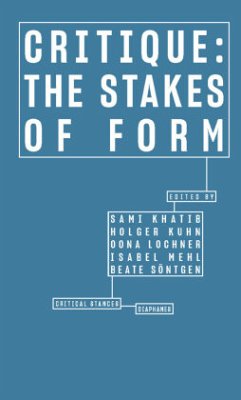
Critique and the Digital
Versandkostenfrei!
Sofort lieferbar
25,00 €
inkl. MwSt.

PAYBACK Punkte
0 °P sammeln!
The computerization of today's world has fundamentally transformed the sites of and for critique, and it challenges the meaning of critique as such. The subject of critique, constituted through the cultural techniques of modernity, now collides with the digital, which, as a condition of contemporary life, can be seen both as a product of modernity and as its very ending. Digitality severely alters the subject of critique and its spacio-temporal relations; it may even deprive the subject of its potentiality to be critical in the first place. The authors of this volume therefore examine the exis...
The computerization of today's world has fundamentally transformed the sites of and for critique, and it challenges the meaning of critique as such. The subject of critique, constituted through the cultural techniques of modernity, now collides with the digital, which, as a condition of contemporary life, can be seen both as a product of modernity and as its very ending. Digitality severely alters the subject of critique and its spacio-temporal relations; it may even deprive the subject of its potentiality to be critical in the first place. The authors of this volume therefore examine the existence of critique in the digital, asking what it might be and in what settings it occurs.












